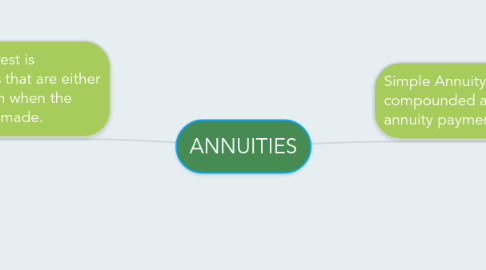ANNUITIES
da Gabriele Cuison Joseph


1. General Annuity: interest is compounded at times that are either greater or smaller than when the annuity payments are made.
1.1. #1 Determine "C" interest period per compounding interval. (number of interest compounding per year / number of payments per year)
1.1.1. C= number of interest compounding per year/ number of payment per year.
1.2. #2 Use "C" to determine "i2", equivalent periodic rate that matches payment interval.
1.2.1. i2=(1+i)^c-1
1.3. #3 Use "i2" as the value of "i" in the appropriate simple or deferred annuity formula.
2. Simple Annuity: interest is compounded at the same time as the annuity payments.
2.1. Ordinary: Payments are made at the end of each period.
2.1.1. Future Value of an Ordinary Annuity
2.1.2. F= R ( (1+i)^n-1/i)
2.1.3. F= future value of annuity
2.1.4. R= amount of annuity payment made per period
2.1.5. i= interest rate per payment period
2.1.6. n= total number of payment
2.1.7. Present Value of an Ordinary Annuity
2.1.8. P= R(1-(1+i)^-n/i)
2.1.9. Periodic Payment of an Ordinary Annuity
2.1.10. R= Fi/(1+i)^n-1
2.1.11. R= Pi/1-(1+i)^-n
2.2. Annuity Due: Payment are made at the beginning of each period.
2.3. Deferred: Payments do not commence until a period of time has elapsed.
2.3.1. Present Value of Deferred Annuity
2.3.2. Pdef=R(1-(1+i)^-n/i)(1+i)^-d
2.3.3. n= time in months
2.3.4. d= number of payment periods for which no payments is given.
2.3.5. Future Value of Deferred Annuity
2.3.6. Fdef=R((1+i)^n-1/i)
